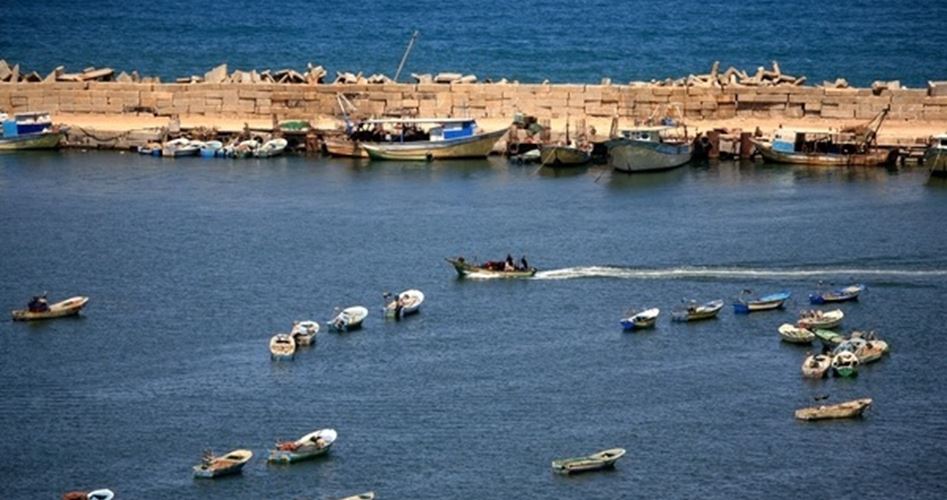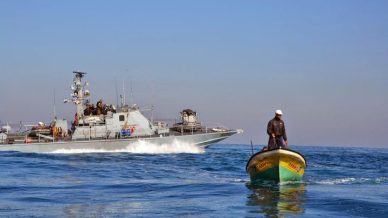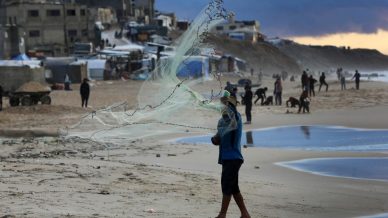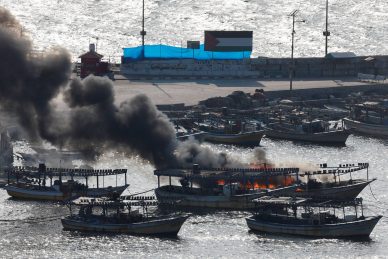In an unprecedented consensus the boats of the fishermen of Dir Al-Balah city were gathered at the beach overlooking the humble sea-port of the city in central Gaza Strip as their owners abandoned them despite the beginning of the fishing season which they usually eagerly wait for during spring.
The boats are docked along the beach during the most important fishing days due to the Israeli navy’s prevention of fishing at more than six nautical miles and the expensive prices of fuel used to run boats which governs fishermen’s decision to fish or not fearing that fishing with such a high price might not be worthy.
Gaza’s fishermen have great expectations during spring and during these weeks for the fishing season during which they could fish Sardines Galapagos batfish and Tarkhon and some Sharks.
The Oslo Accords signed by the Palestine Liberation Organization and Israel in 1993 state that Palestinian fishermen should be allowed to fish at 20 nautical miles yet since the outbreak of the Second Palestinian uprising (Intifada) in 2000 Israel limited fishing to five nautical miles and it violates on daily basis the ceasefire agreement signed in 2014 which allows fishermen to fish at 12 nautical miles.
Some 4000 fishermen work at the Gaza Sea which are registered at the Palestinian Fishermen Syndicate while some 500 fishermen have unregistered small boats.
Increasing problems
The situation of fishermen is going from bad to worse. Since 2017 the Israeli occupation navy have arrested 37 fishermen from the northern Gaza Strip destroyed 8 boats and killed Palestinian fisherman Mohammed Al-Hissi whose boat capsized and his body went missing.
Nizar Ayash the head of the Gaza’s Fishermen Syndicate sips coffee with some fishermen who came to check on some errands and to submit some complaints stresses that the current fishing season of the Sardines is still at the beginning and needs 12-20 nautical miles to be found which is impossible to fish at now.
He adds to the PIC reporter “It also the season for fishing the Galapagos batfish but it cannot be found at six miles the same as the Sardines which are rarely found at six-miles-depth. This season lasts until the beginning of May but the Israeli occupation hunts fishermen at five nautical miles and in the Waha area to the north of Gaza fishermen are restricted to two nautical miles only.”

The Palestinian Fishermen Syndicate obtained grants to rebuild its headquarters which was destroyed during the 2014 offensive on Gaza and to build 12 additional rooms for fishermen from Dir Al-Balah and Khan Younis cities.
Some fish merchants and fishermen resorted to bringing fish from Egypt through the tunnels to compensate for the lack of fish in the market. This year does not look like last year where 1500 tons of fish were sold at the market.
Spring of fish
For the last 35 years Palestinian fisherman Jameel Al-Aqraa 49 has known spring as the season for fishing but the Israeli occupation’s chase of fishermen and the worsening conditions in the Gaza Strip changed his life and threatened the livelihood of eight members of his family who work on three boats he owns.

Despite the fact that fishermen stay away from the sea because the Israeli occupation allows them to fish at five nautical miles only Palestinian fisherman Rashad Farahat 63 comes every day to the Rafah seaport because “the sea is his life.” He knows the Gaza Sea very well and memorizes its details from the Bardawil area in Rafah until Al-Arish city in Egypt 50 km away from the Gaza borders as he says.
He adds to the PIC reporter “I have not fished for the last 20 days. If we are allowed to fish at 12-20 nautical miles we could have got good amount of fish. But five miles are not enough. It is very crowded and full of boats and fishing nets get destroyed. Unfortunately the Sardines season the most important season for us will be lost.”
Farahat has endured a loss of 5000 NIS due to destroying his fishing nets unintentionally by his fishing mates while they were desperately looking for fish to make their living at the six-nautical- miles-depth. He says that based on his experience there should be a 300-400 meter distance between fishermen to allow fish to move and be caught.
Said Abu Ouda 43 when asked about his sea experience he answered saying “I am the son of the sea. I inherited this career from my father who inherited it from my grandfather.” He hopes that the coming days will see improvement because missing the most important season in the year will mean a great loss for fishermen.
He adds to the PIC reporter: “Sadly fishing has stopped now. I have a small boat but six miles are not enough to fish. If we pass the nine miles limit we could catch something.”
















